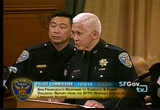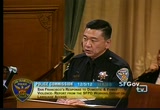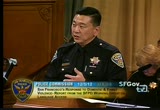tv [untitled] December 8, 2012 8:00pm-8:30pm PST
8:00 pm
helps if a native speaker is there, eases some of the angst the victim may have when reporting a crime. in terms of outreaching and publications, i don't know everything that we have this is internally where we are trying to streamline and have more officers certified. >> i know you have been on the job three months, it's wonderful progress. >> i want to add that we are in the process of creating a card that we can all of the stations have, all psas, where the victim comes in, the card
8:01 pm
explains the process. the card will be printed in five different languages. they can pick the language they speak; point to it, then we know what they need. the officer will get them the service. i want to say that the chief and i especially the chief, he is out there all the time, i work with public affairs and recently we did an interview on the chinese speaking channel on the chinese talkshow. two days ago, i saw the chief being interviewed on a korean show; he is always trying to reach out to all of the communities that we are approachable, we are here to help, we are trying to provide a service to anyone who needs it. all of us are here to help anyone in need. >> i was also going to
8:02 pm
recommend that perhaps you also engage -- america media, and san francisco-based pacific news service. you can put something in english and each media outlet reports on their language with no copyright violations. >> great idea. i want to get that information from you after the meeting. >> commissioner kingsley? >> thank you for your report. >> commissioner kingsley: my questions may be a little premature.
8:03 pm
8:04 pm
>> yeah. 1739 times language line was used. 90 percent is language line. >> what is the reaction to the use of language line? is it reliable? they have a sense that getting quality interpretation? >> by the very nature of using the phone and passing the phone three ways it slows the process. there is no doubt about it. when we dig down into the nuances, language line is what
8:05 pm
we have, they are professional. we trust them. they can testify as well in court. there is three-ways to say something. by the very nature of trying to hand the phone back and forth. >> how long does it take once a call is initiated? >> immediate. >> and the users reaction? i know that you have developed cards, and that would help a lot in terms of their reactions. is it off-putting? >> they understand. they are giving their story and it is relayed back to the officer, and the officer asked another question, back and forth, until we get the whole
8:06 pm
story. it works. sometimes it is cumbersome the way to set up. >> commissioner kingsley: do we know if there are any high-quality computer interpretation applications yet? >> personally, i have an app on my phone, and i have used it a number of times. not something important. i use it to get the nuances. but as far as anything else i am not aware of. >> commissioner kingsley: curious as to whether or not we were following the technology. >> you mean speaking into something and have it automatic to dictate into english? >> well yes but on a more professional level, a particular software application developed. (off mic)
8:07 pm
>> the best thing is to have an interpreter. >> commissioner kingsley: a real person, absolutely. thank you very much. >> commissioner chan? >> commissioner chan: in terms of the reference to psas, says we are televised, we can educate the public on how to make it was reported you are involved in domestic violence. can you describe what the issues were, and how we can collaboratively address the issue? here is how it works. when there's a problem you go to the department or the commission and we address it. >> one thing that sandra had spoken about in our workshop is that there was an issue where psa may not have known severity of the walk-in who had some
8:08 pm
type of an issue. prior to me get in there. if you have an issue, and you don't speak, don't leave. the last thing we want to do is have the person leave. if this is impractical emergency, point to this. if it is something else stand by and we will either get an interpreter or line with service, that is what is going on with psa; they were being retrained on that a couple of months ago. beginning in january there are going to have a continuous professional training just like we have for advanced officers who do that every two years. >> i think i know what you exactly want. we learn that a victim came to the station and try to report
8:09 pm
-- this is domestic violence -- unfortunately the police service aid who do not speak the language and who could not get someone to assist told the victim to go home. an officer will be going to their home to make a report. the officer was never dispatched; they can came back the next day along with their teenage son and report was made through their teenage son being an interpreter, absolutely unacceptable. we learn about this with the meanings. you brought it to light. we address it immediately as a group. we try to think of ways to fix this problem. one is supervision and training and came up with that card. not only role-cal training but
8:10 pm
our biennial training, and video to make sure we never dropped the ball again. even one victim having to suffer through that is an acceptable. >> i brought that case to light for the group. and the glitches where police service aids and civilians are not the place to take a domestic violence report. and encountering a language barrier. >> actually that is what i was going to bring up. we recently met at cameron house with some of our asian
8:11 pm
partners, and that was a concern not the specific incident, speaking cantonese or another language in the person realizing they cannot make the report and the person at the other end realizing that she was not making a report. i don't know the logistics. can the police service aid take a report? >> any type of sexual offense or domestic violence they're not authorized. we're coming up with the card to explain to the victim that the psa, is unable to do so, but stay there, we will get an officer to take the report and explain the process to them so
8:12 pm
they don't have the anxiety and feel they are not being helped. >> to take up on this comment, at the neighborhood meetings that we have had in the past month, i'm glad that you are wrapping up more certified bilingual officers. it makes the victim not want to come back and make a report. certain refugee groups, particular the cambodian, laotian, and now iraqi women are distrusting of government. i would like to suggest that maybe we can have partnership with our technology partners to have particular tablets and face time, and split screen. often times when we are speaking it is not just that we say or hear, but the body
8:13 pm
language as well. for these women from war-torn countries they are distrusting and if they cannot see the person they will hang up. >> that is an excellent idea. it is another homework assignment. will get it done. i will see what we can do. we are coming up with computers and tablets and handhelds. if we can put that technology there we will work towards that goal. >> my question goes back to the ongoing issues. i would gather that this topic has been raised already with the police commissioner or discuss discussed at the commission level.
8:14 pm
the concern with immigrant communities is that interaction with the police could lead to either party, both parties, being deported and how that is being - whether there is training that sensitizes the least of this, or how is it handled? >> commissioner, it's been the policy of the san francisco police department since the sanctuary city ordinance was passed over 30 years ago, before i became a police officer, it isn't just something we need to train to. it's always know. i can assure anyone watching on tv at this commission, san francisco is a sanctuary city.
8:15 pm
we are here to help regardless of your country of origin or language. we are working hard as you can tell to figure out the language. chief beal spoke about me doing those interviews. i don't speak korean and chinese. we do spanish radio once a month, speak with marcos gutierrez about whatever they want to talk about; sanctuary city has come up more than once. it is not a training issue for us. it is department policy. it is city law. it is what we have been raised on. >> does the department have the authority to control that information within its own database so it is and shared with the federal authorities? >> what information is that?
8:16 pm
>> my understanding is there is no opt in and out. maybe commissioner chan can say something. >> secure communities is a post-arrest situation, a sheriff situation. those questions are not asked at the police department level. >> the chief has been extremely supportive of efforts by community groups. chief beal recently met with community groups about the same issue, that is something they have been receptive, trying to address. -- has resulted in over 638 deportations as of august this year. it has an impact on the victims
8:17 pm
of domestic violence. it is a continual problem. >> but not from the san francisco police department. >> there is a reason case, longer story. not because of the specific police officers fall; this program has a direct connection to the immigration database. it is problematic. >> commissioner cahn is passionate about. >> appropriately so. while it is a policy in the training within the police department, it is a sanctuary city however there is a reality of the federal program
8:18 pm
that does affect people's lives. that is a conflict that could bear some understanding, i think. >> commissioner kingsley. >> commissioner kingsley: not that this is necessarily the forum but i thought that in today's paper the attorney general indicated that it was optional whether or not a jurisdiction wanted to turn over this data, and that we aren't under an obligation to forward data when low-level crimes. >> i spoke to the attorney general myself. i told her that we would continue to do, and that she understood that.
8:19 pm
but the notification is compulsory. >> i did not read the article that you're referencing. i understand that the issue was at california says it's optional. the federal government says it is not. in the meantime, this is what i am addressing. >> commissioners i want to be really clear because this is on television. for anybody the lives in san francisco, we are a sanctuary city. your status living in the united states is not an issue. we will not report. please. trust your san francisco police department. call us. we are here to help.
8:20 pm
>> commissioner turman: thank you chief for pointing that out. we already had a constitutional law here, i'm not sure that it is hour is the best use. the attorney general did do a law-enforcement bulletin; the issue is whether the local jurisdiction is obligated to use state resources to do a federal detainer; it is specific to the sheriff's department. part of the notion is that it is not the job of from my law enforcement to enforce immigration policy; we are here to keep people safe. we appreciate the chief's passion. and ultimately where people
8:21 pm
come is not relevant and using this forum is important to underscore that commitment, and i'm glad the chief is clear and unequivocal about that. >> victims are not at risk for deportation. that is abundantly clear from what the chief has said. our next line item is regarding the san francisco police department special victims unit. >> i would like to introduce deputy director, lisa hoffman, waiting to tell you about the new system. >> sorry about that. >> good evening and thank you for letting me have a moment to speak. i will keep it brief.
8:22 pm
we have been in the process after procuring enough that you are 911 system. the current system we have is 12 years old, antiquated. we are not able to currently tell whether an officer have special skills so we don't is best based on skill sets. we will have a processes to install, we upgrade to the new system in 2014 will have the capability to identify officer skill sets and identify and tabulate when we translate on a call. we have no way to currently manage the data to tell us when a call speaking a different language. one of the primary objectives of the new product is to have a system that allows us to determine when we translate
8:23 pm
for somebody. we have a large member of staff who are language proficient and come from primary speaking language, fluent in their native language. we are looking to get more dispatchers qualified and certified a second language proficient. we are taking information from line from a victim who is hysterical. rather then transferring them to a second party we want to do the translation ourselves. we have been fortunate although -- realizes that we have problems in getting people to certified translation, it is an expensive process. we are willing to wait. we took money out of our own budget the certify 7 new staff members.
8:24 pm
something in the best benefit of our clients. we are interactive with this process. we do a lot of outreach and speaking engagements where we take our staff that speaks the native-language to those events to make sure the public knows we are not judging them, we don't care where they came from, we just care about getting services that they need. >> i would like for you to hear from -- in the trenches 24/7, working with people speaking many languages that have many different barriers. i would like to have -- come up and talk to you about this. >> thanks beverly.
8:25 pm
we are running really late. i will keep it brief. language access is a safety issue. we talked about officers securing the scene and worried about the safety of individuals and involved with their own safety when they come upon the scene trying to figure out what is happening. language access can be the difference between a dv homicide happening or not happening. for my organization, where we work every day on civil/legal remedies and integration remedies for dv survivors it is something we encounter on record basis. the dv survivor community that we work with, primarily immigrant, limited english proficient, they will not be a big events or have all the access to some of the
8:26 pm
information that comes out now. in addition, they are also not likely to be people who will complain. the people who hear those complaints are me and other attorneys who do the kind of work that we do and legal services and social services agencies. they're not likely to call occ to make a complaint. i think anything that relies purely on occ complaints or some other kind of data will be misleading. we are grateful to have this partnership. it is not often that legal services organizations get to regularly meet with law enforcement and learn about their experience. i really appreciate officer hall who is also in eric chang's position; our organization has been involved with this commission for six
8:27 pm
years. while we have made lots of progress distilled is appointed that on a regular basis, almost every day, i will talk to someone who said that they did not know that they could have an interpreter. they were not offered an interpreter. they did not even get to speak to the police officer on the scene because there was no interpreter or they have to wait an hour or something along those lines and when you think about for survivor, even if they know they will get to have an interpreter, if they have to wait whether an hour or 45 minutes and during that time the officer is talking probably to the abusive partner, it changes the dynamic. the police come in but they're not always 100 percent sure that calling the police in the situation is going to be the most successful route. and then you have is a situation where they're not
8:28 pm
able to communicate, that don't know what is going on and the city officer talking to the abusive party who a lot of times is a lot more proficient in english and it creates a dynamic of mistrust, we are grateful to the officers who are willing to use their personal cell phones to call language line. the reality is, in the resource environment that we are in, getting the bilingual officer to the scene is time-consuming and elongates the whole process. not having access to a cell phone for an officer forces him into position to use whatever is available or the personal cell phone. that should not be the case. one thing we do, i want to mention as a program, as a policy that we would like to
8:29 pm
see,we would like to see language line gets training on domestic violence awareness and maybe cultural competency issues. they provide a huge service to the city. the city is one of their biggest clients. i think there is a lot to be said for the idea that language in and of itself is not a panacea; it is not monolithic. there is a difference between saying a restraining order and saying something else, and how you even talk to the victim of trauma is vital. we would like to see more involvement, rather than assuming that they are the experts which is i think how the police have looked at it in the past. language line is the expert on language, and they should teach us. we have a lot to teach interpreters as well about how to effectively communicate with them. one more thing
87 Views
IN COLLECTIONS
SFGTV: San Francisco Government Television Television Archive
Television Archive  Television Archive News Search Service
Television Archive News Search Service 
Uploaded by TV Archive on

 Live Music Archive
Live Music Archive Librivox Free Audio
Librivox Free Audio Metropolitan Museum
Metropolitan Museum Cleveland Museum of Art
Cleveland Museum of Art Internet Arcade
Internet Arcade Console Living Room
Console Living Room Books to Borrow
Books to Borrow Open Library
Open Library TV News
TV News Understanding 9/11
Understanding 9/11




























